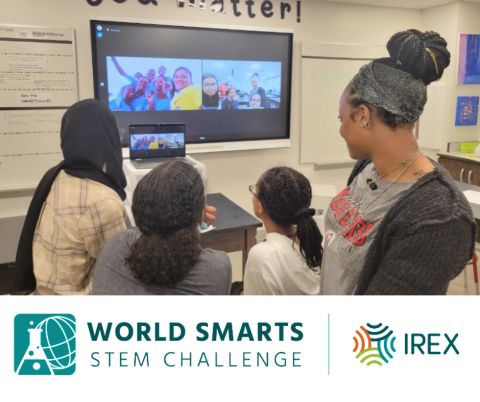Body
Image

Welcome to the World Smarts STEM Challenge!
The World Smarts STEM Challenge is a virtual exchange that supports STEM (science, technology, engineering, and math) education in the United States and Ghana. Middle and high school students from Washington, DC, and senior secondary school students from across Ghana come together virtually to solve global issues in their communities with STEM solutions inspired by the UN Sustainable Development Goals.
Pillar 1: Innovative Use of Technologies in Learning and Teaching
World Smarts provides students with an opportunity to utilize and engage with educational technologies that support communication, collaboration and simulate global workforce environments and scenarios. The official program tools include Canvas – Instructure, Pronto, Flipgrid, Zoom and Microsoft Teams. The program also offers and encourages students to use other school-approved tools for increased accessibility and usability considering each classroom setting and context. Educators are trained on how to use these tools.
Pillar 2: Partnerships for Career and Workforce Preparation.
The project engages school partners and STEM professionals to support students’ engagement throughout the exchange. Partnerships with schools aid the facilitation of student supports, e.g. community services hours for career development. STEM professionals serve as mentors, guest speakers, and consultants to inspire students’ STEM learning, provide technical advice, and offer insights on pursuing STEM/ICT careers. Students prepare and present at an expo where they practice public speaking to a diverse global audience.
Pillar 3: Strategies for Equity in STEM Education
A robust outreach plan and recruitment strategy engages educators and students from diverse and underrepresented backgrounds, including Black, Hispanic, economically disadvantaged and female students. Outreach to public schools includes showcasing diverse role models and collaborating with industry for real-world experiences. Educators engage in IREX-led training focused on implementation, inclusive facilitation methods, and fostering an environment that recognizes and respects diverse learning styles.

Discipline(s)
Chemistry
Computer and informational technology science
Data Science
Engineering
Environmental sciences
Geosciences
Interdisciplinary
Life sciences
Mathematical sciences
Physics and astronomy
Other
Target Gradespan(s)
Middle school (6-8)
High school (9-12)
Target Participant(s)
Youth / students
Educators
Girls (or women)
American Indian/Alaska Native participants
Black/African American participants
Hispanic/Latino participants
Native Hawaiian/Pacific Islander participants
English learners
Students eligible for free lunch or reduced-price lunch
Participants with disabilities
Other
Project Setting(s)
Formal Education
Informal Education
Other
Category
Developing and Testing Innovations (DTI)
Scale-Up
Youth-Based